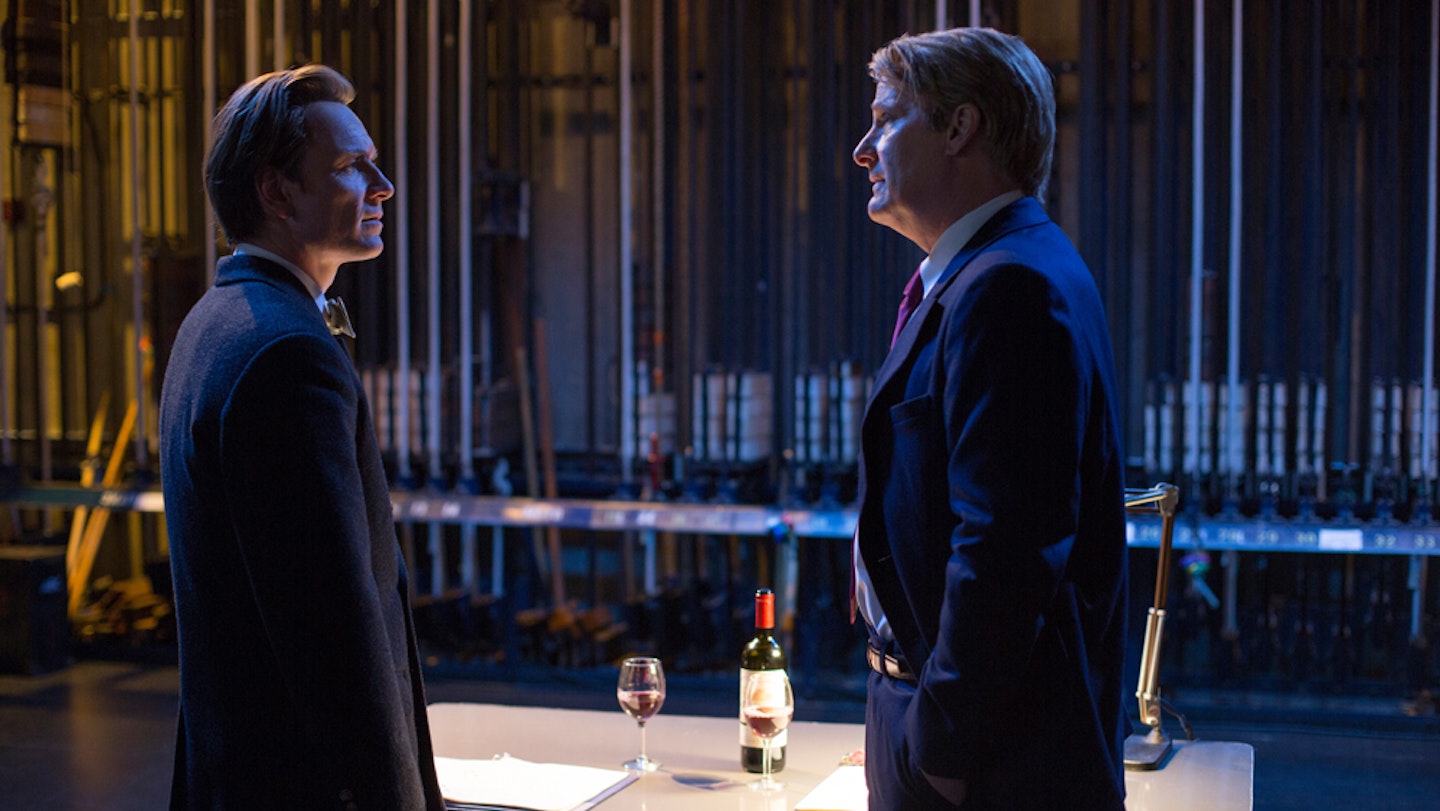This week sees the release of biopic-that’s-not-quite-a-biopic, Steve Jobs. Written by Aaron Sorkin (the pen behind other semi-biopics Moneyball and The Social Network), Danny Boyle’s latest adopts a three-act structure set against a trio of Jobs’ technological unveilings.
Sorkin's machine-gun-speed wordplay is the highlight, quickfire banter flying between Michael Fassbender, Kate Winslet, Seth Rogen, Jeff Daniels and Michael Stuhlbarg amongst others, with a key showdown between Fassbender's Jobs and Daniels' Sculley taking the verbal jousting crown.
As a dialogue master without peer, we asked Sorkin to break down some of his most impressive screenwriting feats – not before taking us to the core of his latest Apple-based outing, of course.
Steve Jobs vs. John Sculley (Steve Jobs)
"The scene is the result of skipping over the most dramatic thing that happened in those years which was Steve Jobs leaving Apple – getting fired or quitting, depending on who you talk to or how you interpret what we show you. It skips over that and then just some interstitial material between Acts I and II. We hear Steve Jobs has left Apple, and I did that knowing that in the second act I was going to go back and we were going to relive how that happened.
It’s very theatrical, I think it’s the kind of thing you can go back and watch a couple of times and start noticing new things. Just the production design of that balcony lobby area where the seats are on top of the tables with the legs sticking up is so visually interesting and it seems like a gunfight is about to happen.
I love that scene and I feel like it’s ok for me to say so because I feel like it was a triumph of collaboration. I think I wrote a fine scene and that it was fine on paper, but in come Jeff [Daniels] and Michael [Fassbender] and Danny [Boyle] and our editor Elliot Graham and our composter Daniel Pemberton and it played like a bank robbery or a prison break. Now in real life, John Sculley and Steve Jobs never spoke again after Steve left Apple, but I imagined two more scenes after that: the one in the second act and then the one in the third act."

"Oddly, in the rough-cut phase, it was one of the scenes we were having the most trouble with: it wasn’t singing yet. You could tell there was a lot of potential there. But something was wrong, like having a pebble in your shoe. And by just clipping two frames here, adding two frames there and moving this here, punctuating something with score there, it built speed and power and it’s a scene I love, it’s a scene I’m gratified that other people like. It was absolutely written the way you see it onscreen. It’s a great example of the fact that the director does more than call ‘action’ and ‘cut’, that he or she is really shaping it. You can’t do that scene in a novel: that scene can only be performed. It can’t be read."
Judd Hirsch vs. TV (Studio 60 On The Sunset Strip)
"The opening of Studio 60, Judd Hirsch’s piece. There’s some wish-fulfilment there. It’s a bit of an homage to Network, where someone hijacks live television to tell some big truth.
I remember shooting that scene, how great it was to work with Judd. The bleachers were filled with extras playing the studio audience, they had never seen or heard the scene before, so they would break out in cheers when Judd was doing it and we would have to ask them not to do that because the audience kind of needs to be stunned by this instead of cheering it.
I was glad that NBC let me do the scene, because in Judd’s speech he is certainly at the very least hinting at – well, he does more than hint – at a number of NBC shows. He says, 'we’re having contests to see who can be the most like Donald Trump', he’s talking about The Apprentice, a Donald Trump show. 'We’re paying people to eat worms', that was Fear Factor. So I was really pleased that NBC let me do it and I loved making that pilot. We only got to be on the air for a year but I loved the whole year."
Jeff Daniels vs. America (The Newsroom)
"Also an homage to Network, and now to Studio 60. It was, by some people in the US, misunderstood. There are people, sort of hard right-wing people, who get very upset when anyone says anything bad about the US. I consider myself a very patriotic person, but my patriotism has nothing to do with ‘don’t say bad things about the US’, or ‘you’ve got to fly a flag’, or ‘you can’t burn a flag’.
But mostly what these people missed is that this was a man having a nervous breakdown. He had come to the end of his rope and was sort of pushed over by what he thinks is a hallucination, out in the audience, of the love of his life who he hasn’t seen or spoken to in several years. She's out there being a producer, prompting him, saying ‘look at this’. And he becomes unspooled and speaks the truth but in a kind of coarse way; speaks to students the way you wouldn’t want to speak to young people, that kind of thing."
Aaron Sorkin vs. Foreign Languages
"I do have to get translators. Other than English I took Russian in high school but I’ve lost most of it because I haven’t had a chance to use it. But I’ll usually get two translators: the first one will do the translation and then I have the second one translate the translation back to me. The reason I'm attracted to doing things from time-to-time in other languages is the musicality. Any time someone is speaking for the sake of performance, whether it’s an actor in a play or a movie, a preacher in a pulpit, a political candidate speaking on the stump, all the rules of music apply. So suddenly you’ve kind of gone into a different movement in the piece.
I think it displays some erudition on the part of the character, and in Bartlet’s [President Jed Bartlet, played by Martin Sheen in The West Wing] case, speaking to God, cursing out God, it was, ‘I’m going to do this in your language. I’m going to be an equal of yours. I know Latin, ok, I can speak your language so I’m going to say this to you in your language. I won’t make myself smaller to you by making you understand English’."
"In the case of Sloan [Sabbith, Olivia Munn's character in The Newsroom], I knew Olivia before we did the show, I knew that she spoke fluent Japanese, I had that in my pocket. I had the story where it could be used. We always showed Sloan as a very smart person, but just with numbers, stocks and figures. Well, here was another club she had in her golf bag. And a way to leave her producer Don Keefer behind: ‘my God, what the hell is going on! I have no idea what they’re saying, but something tells me we have a problem!’ And again, it was just something you don’t usually see on TV. So it just seemed like it was better than doing it in English."
"In my room last night, I was watching Inglourious Basterds, I love that movie so much. And how great is Fassbender in that movie? Fantastic. But it wasn’t until last night watching Inglourious Basterds that I realised how much of it isn’t in English – most of it isn’t in English. And you don’t notice that, at all. It’s remarkable!"
Steve Jobs is released on Friday November 13.
